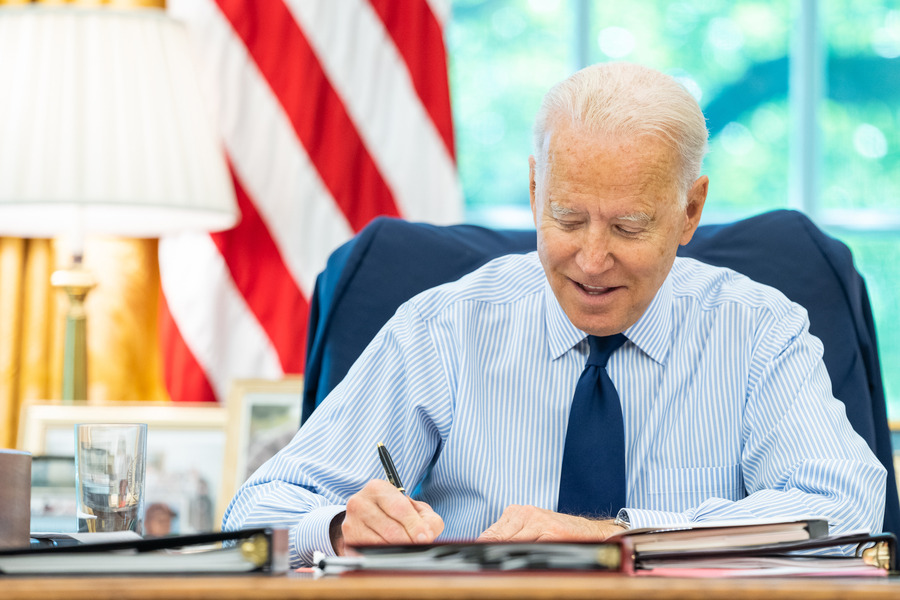Today's Headlines and Commentary
Published by The Lawfare Institute
in Cooperation With

My legislation would also allow companies to publicly report on how many Patriot and FISA orders they're getting and how many of their customers these orders affect. There's a way to do this that protects national security. Since 2009, Google has been reporting on the number of national security letters it receives, and that hasn't hurt anyone. I frankly think that after Snowden's disclosures, an even stronger case can be made that we can achieve greater transparency without harming national security.As Paul noted already, today's the day the House will vote on an amendment to the Defense appropriations bill to defund the NSA's surveillance programs. The amendment was proposed by Republican Justin Amash, and is one of a few controversial additions that will be debated on the floor. The White House has derided the Amash Amendment as an effort to "hastily dismantle one of our Intelligence Community's counterterrorism tools," and NSA Chief Keith Alexander spent the evening on Capitol Hill lobbying against the amendment. Here's Jeremy Herb reporting at The Hill. As it happens, Journal opposes the Amash Amendment:
This would greatly complicate the job of preventing future terrorist attacks, because metadata can link a known suspect to a terrorist or terror cell that U.S. officials weren't aware of. The sifting of metadata helped the FBI locate and stop the New York subway bomber.
There are lots of other provisions the House has considered for this bill: prohibiting civilian furloughs, supporting efforts in Afghanistan, and blocking sex offenders from joining the military, among them.
One amendment rejected was brought by Rep. Jim Moran, and would have stripped the prohibition on transfers out of GTMO. Apropos, today, a Senate Judiciary Committee subcommittee will meet to discuss whether to close GTMO detention facility. Here's the list of witnesses:
Panel I- The Honorable Adam Smith, United States Representative (D-WA-9)
- The Honorable Mike Pompeo, United States Representative (R-KS-4)
- Major General Paul D. Eaton, United States Army (Ret.)
- Brigadier General Stephen N. Xenakis, M.D., United States Army (Ret.)
- Lieutenant Joshua M. Fryday, Judge Advocate General's Corps, United States Navy
- Frank Gaffney, Founder and President, Center for Security Policy
- Elisa Massimino, President and Chief Executive Officer, Human Rights First
Meanwhile, the editorial board of the Post calls on Congress to pass legislation to shield journalists, in response to the 4th Circuit's decision to require Times reporter James Risen to testify about his sources.
The New York Times Room for Debate section pondered the prospect of NYPD Commissioner Ray Kelly becoming the next Secretary of Homeland Security. Mr. Kelly, in the meantime, authored an op-ed in the Wall Street Journal about what his controversial methods involving racial profiling have accomplished---according to him, saving over 7,000 lives. And if you haven't read Carrie Cordero's post discussing traits we should look for in DHS's future leader, check it out. Senator John McCain seems to have rediscovered his maverick side. Rather than joining with many of his GOP comrades, and placing a hold on General Martin Dempsey's re-nomination to remain as Chairman of the Joint Chiefs of Staff---because of disagreement over Syria policy----McCain's is taking the high road. He will forgo the delay tactic on the nomination, apparently. Here's the Post story with the details. While thousands of civilian federal employees take "Furlough Fridays," the defense industry seems to be faring just fine during the sequester. At the at the Washington Post, Marjorie Censer and Jim Tankersley discuss released profit reports for some defense contractors. Big news from the D.C. Circuit: in the remand of Zivotofsky v. Clinton, the D.C. Circuit struck down as unconstitutional Congress's effort to require the Department of State to record "Jerusalem, Israel" in the passports of U.S. citizens born in the holy city, if they so requested. The New York Times profiles this study just released by Brookings, the US Institute of Peace and the US Holocaust Memorial Museum, recommending policy for the United States on the responsibility to protect ("R2P") doctrine. Greg Miller notes the coming closure of the CIA's Afghanistan bases at the Post. The United States military, meanwhile, is helping Iraqi forces to track down prisoners who escaped from two Iraqi jails earlier this week. Here's Carlo Munoz reporting on the DoD's efforts. Orin Kerr notes a Huffington Post story about the impact of sequestration on the federal public defender system. We noted this news a few months ago in terrorism-related cases. Curious about the comparative impact of cybersecurity breaches? Check out Information is Beautiful's graphic display of selected data breaches. For those who enjoyed the video Ben posted of Niagara Falls from the perspective of a drone, Dronestagram will be fascinating as well. For more interesting law and security-related articles, follow us on Twitter, visit the Georgetown Center on National Security and the Law’s Security Law Brief, Syracuse’s Institute for National Security & Counterterrorism’s newsroll and blog, and Fordham Law’s Center on National Security’s Morning Brief and Cyber Brief. Email Raffaela Wakeman and Ritika Singh noteworthy articles to include, visit the Lawfare Events Calendar for upcoming national security events, and check out relevant job openings at the Lawfare Job Board.




